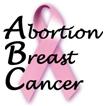Experts acknowledge abortion-breast cancer link
Scientist: Abortion Caused Over 300,000 Additional Breast Cancer Deaths Since Supreme Court's 1973 Roe v. Wade Decision / Experts privately acknowledge abortion-breast cancer link, but say it's too political to discuss publicly
The Coalition on Abortion/Breast Cancer announced that three experts will be available for interviews to discuss the impact of the abortion-breast cancer (ABC) link on the Roe v. Wade generation during the month of January. Their contact information and their quotes are available below.
Karen Malec, the Coalition's president, said,
"During the last 21 months, four epidemiological studies and one review reported an ABC link. 1 2 3 4 5 One study included National Cancer Institute branch chief Louise Brinton as co-author. 3 We count nearly 50 published epidemiological studies since 1957 reporting a link. Biological and experimental studies also support it.
"Experts proved in medical journals that nearly all of the roughly 20 studies denying the link are seriously flawed (fraudulent). Like the tobacco-cancer cover-up, these are used to snow women into believing abortion is safe." 6 7 8 9 10 11 12 13 14 15 16
Professor Joel Brind and his colleagues reported a "30% greater chance of developing breast cancer" in their 1996 review and meta-analysis of worldwide data. 17 He said recently:
"If we take the overall risk of breast cancer among women to be about 10% (not counting abortion), and raise it by 30%, we get 13% lifetime risk. Using the 50 million abortions since Roe v. Wade figure, we get 1.5 million excess cases of breast cancer. At an average mortality of 20% since 1973, that would mean that legal abortion will have resulted in some 300,000 additional deaths due to breast cancer since Roe v. Wade."
Brind said his estimate excludes deaths from the use of abortion to delay first full term pregnancies - a recognized breast cancer risk.
In 2002, Angela Lanfranchi, MD testified under oath in a California lawsuit against Planned Parenthood that she had private conversations with leading experts who agreed abortion raises breast cancer risk, but they refused to discuss it publicly, saying it was "too political."
The Coalition on Abortion/Breast Cancer is an international women's organization founded to protect the health and save the lives of women by educating and providing information on abortion as a risk factor for breast cancer.
- 1. Ozmen V, Ozcinar B, Karanlik H, Cabioglu N, Tukenmez M, et al. Breast cancer risk factors in Turkish women – a University Hospital based nested case control study. World J of Surg Oncol 2009;7:37. Available at: http://wjso.com/content/7/1/37.
- 2. Xing P, Li J, Jin F. A case-control study of reproductive factors associated with subtypes of breast cancer in Northeast China. Medical Oncology, e-publication online September 2009. Available at: http://www.ncbi.nlm.nih.gov/pubmed/19771534.
- 3. a. b. Dolle J, Daling J, White E, Brinton L, Doody D, et al. Risk factors for triple-negative breast cancer in women under the age of 45 years. Cancer Epidemiol Biomarkers Prev 2009;18(4)1157-1166. Available at:
- 4. De Silva M, Senarath U, Gunatilake M, Lokuhetty D. Prolonged breastfeeding reduces risk of breast cancer in Sri Lankan women: a case-control study. Cancer Epidemiol 2010;34(3):267-73. Abstract available at: http://www.ncbi.nlm.nih.gov/pubmed/20338838
- 5. Lanfranchi A. Normal breast physiology: The reasons hormonal contraceptives and induced abortion increase breast cancer risk. The Linacre Quarterly 2009;76:236-249. Available at:
- 6. Furton E. Editorial. The corruption of science by ideology. Ethics and Medics (Dec. 2004) Vol. 29, No. 11, p. 1-2. Available at:
- 7. Schlafly A. Legal implications of a link between abortion and breast cancer. J Am Phys Surgeons 2005;10:11-14. Available at: http://www.jpands.org/vol10no1/aschlafly.pdf
- 8. Brind J. The abortion-breast cancer connection. National Catholic Bioethics Quarterly Summer 2005; p. 303-329.
- 9. Brind J. Induced abortion as an independent risk factor for breast cancer: A critical review of recent studies based on prospective data. J Am Phys Surg Vol. 10, No. 4 (Winter 2005) 105-110. Available at: http://www.jpands.org/vol10no4/brind.pdf.
- 10. Brind J. Letter. Induced abortion and breast cancer: A critical analysis of the report of the Harvard Nurses Study II. J Am Phys Surg 2007;12(2)38-39. Available at: http://www.jpands.org/vol12no2/brind.pdf.
- 11. Brind J. Letter. Breast cancer in relation to abortion: results from the EPIC study. Int J Cancer. 2008 Feb 15;122(4):960-961.
- 12. Brind J. California Teachers Study report on incomplete pregnancy is flawed. Contraception 2009; Mar;79(3):240.
- 13. Brind J, Chinchilli VM. Letter. On the relation between induced abortion and breast cancer. (letter) Lancet Oncol 2002;3:266-267.
- 14. Brind J, Chinchilli V, Severs W, et al. Letter. Relation between induced abortion and breast cancer. J Epidemiol Community Health 1998;52:209-212.
- 15. Brind J, Chinchilli V, Severs W, Summy-Long J. Letter. Induced abortion as an independent risk factor for breast cancer. J Epidmiol Community Health 1997;51:465-68.
- 16. Brind J. Induced Abortion and Breast Cancer Risk: A Critical Analysis of the Report of the Harvard Nurses Study II. Journal of American Physicians and Surgeons (Summer 2007) Vol. 12, No. 2, p. 38-39. Available at: http://www.jpands.org/vol12no2/brind.pdf.
- 17. Brind J, Chinchilli V, Severs W, Summy-Long J. Induced abortion as an independent risk factor for breast cancer: a comprehensive review and meta-analysis. J Epidemiol Community Health 1996;50:481-496.



